Growing ginger is very easy. But planting them in the right soil is very important if you want bigger and healthier ginger rhizomes and flowers. But what is the right kind of soil? Let’s understand.
Ginger requires well-drained, fertile, and loamy soil that remains moist most of the time but doesn’t retain water for long. An ideal soil mix for ginger would be a mix of 50% garden soil with 25% cocopeat and 25% compost. The ideal pH should be between 5.0-6.5.
To acquire detailed knowledge about the soil requirements of ginger plants, go through the article till the end. You will also get to know some ideal soil recipes for ginger.
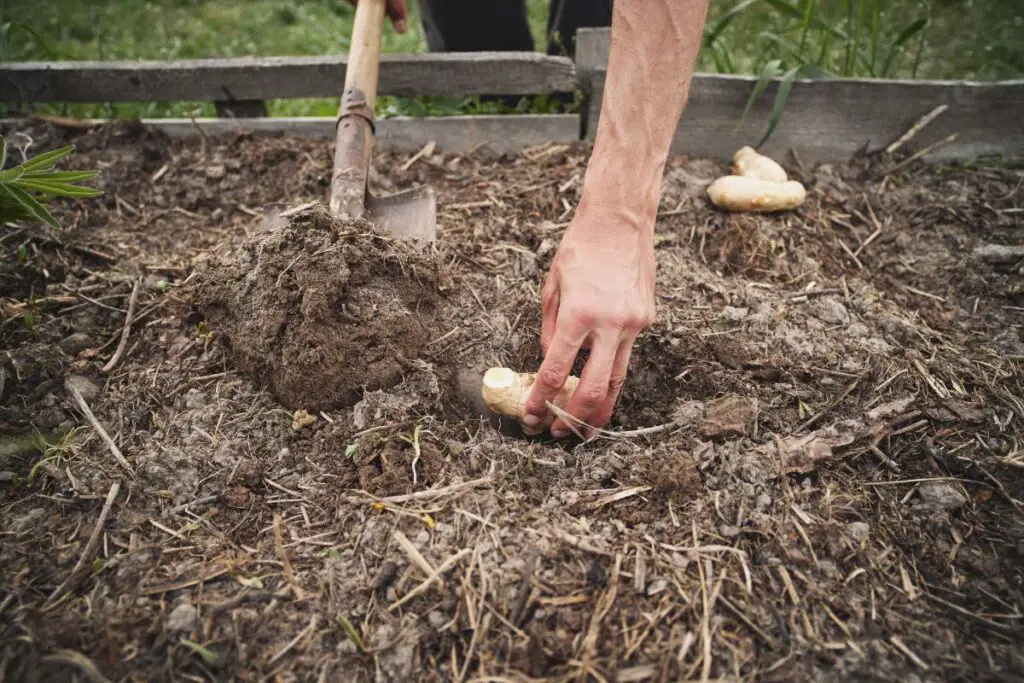
What is the importance of using the right soil?
Planting ginger in the right soil is essential for their growth and development.
If the soil is wrong, their growth will not happen up to the mark.
Several problems will restrict their development.
While planting ginger, prepare a well-drained, loamy, loose, and fertile soil mix.
If it isn’t, you must add some extra ingredients to make it perfect for ginger plants.
The right soil helps ginger in:
- Healthy and faster growth
- Tasty ginger
- Bigger rhizomes filled with moisture
- Overall development
Good soil also prevents the ginger plants from overwatering, underwatering, and lack of nutrients.
Signs you are using the wrong soil.
While growing ginger plants, they may display certain signs, which will signify that they are not getting used to their growing medium.
Some signs include yellow or brown leaves and soggy or extremely dry soil.
Some of them are signs of overwatering, underwatering, or lack of nutrition which gets displayed despite you following the right care tips.
Some signs that result due to wrong soil type are:
- Soil remains waterlogged
- The leaves are papery due to excessive water drainage
- Leaves get yellow or brown due to poor fertility because nutrients get washed away.
- Waterlogged soil leading to rhizome rotting
- Stunted growth
- Less ginger production due to infertility
Factors to consider while choosing soil for ginger plants
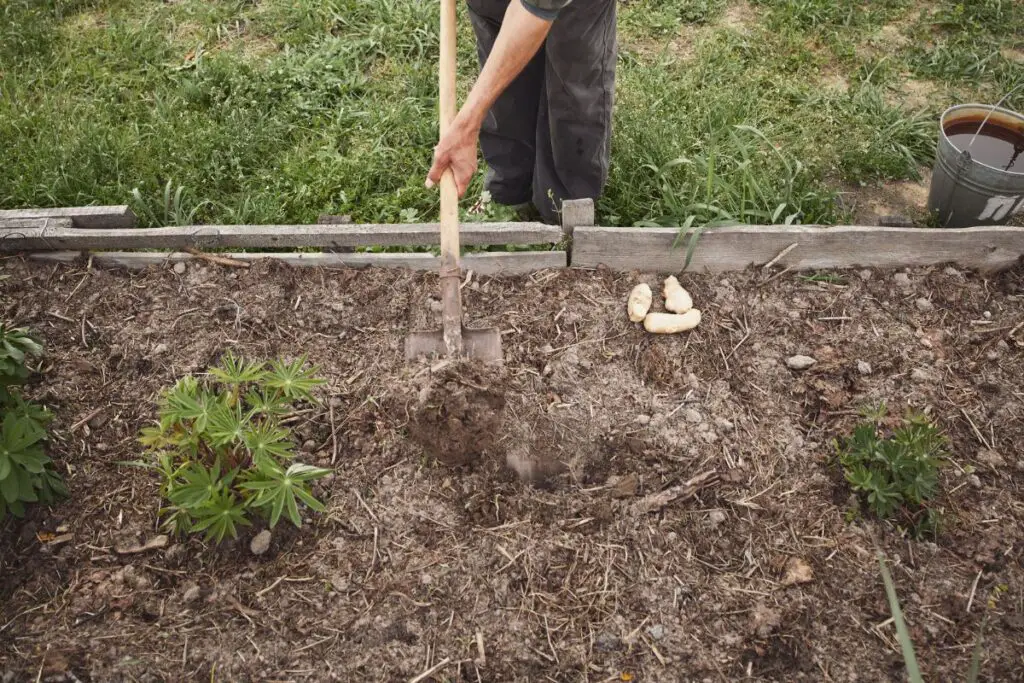
Usually, ginger plants can grow in various types of soil in various climatic areas.
But the best one is humus-rich organic soil that retains moisture and drains well.
Let’s have a look at the various factors that determine the right soil for ginger plants:
Drainage
Ginger plants are known and wanted for the rhizomes that stay under the ground.
The soil stays airy and crumbly, allowing these rhizomes to remain big and healthy.
Soil with loose particles and large spaces allows the water to enter and seep through the ground directly.
It prevents water accumulation and waterlogged soil.
The loose particles create space in the soil, which helps easy air circulation.
Soils with adequate quantities of sand, perlite, vermiculite, and compost are great for good drainage and best for the ginger plants.
Retention
Only drainage won’t be enough for the ginger plants.
The ginger plants also enjoy remaining in moist soil.
They will need a lot of water, provided they are not getting drowned.
So, the soil you choose for ginger plants must have good moisture-holding capacity.
Since the plants like moist soil, you don’t have to water them daily with moisture-retentive soil.
Make sure that the moisture also drains in time.
Change the soil if the gingers are always flooded in the soil you are growing them in.
Maybe it has high concentrations of clay.
Though ginger plants like moist conditions, you must avoid clay soil.
Add some organic matter to improve the drainage quality.
Or, you can try other methods like planting ginger over raised beds.
Fertility and nutrition levels
Ginger plants will require a decent amount of nutrients to survive in the long run and have a good harvest.
An ample amount of nutrition promotes better growth and development. It is as important as the other factors.
The soil must have essential nutrients like nitrogen, phosphorus, potassium, calcium, magnesium, and sulfur. It also needs other micronutrients like copper, zinc, boron, manganese, chlorine, etc.
To know about the nutrients present in the soil, you can test the soil with ready-made soil testing kits or send them for testing to the labs.
pH levels
The pH level of the soil is equally important as other factors.
It determines the acidity and alkalinity of the soil.
In ginger, it has to be within 5.5-6.5.
If the pH gets lower than 5.5, the soil becomes too acidic.
Add calcium carbonate or dolomite to neutralize it.
If it exceeds 6.5, add coffee grounds, sulfur, or homemade compost mixture.
Soil sanitization
Ginger needs healthy and good-quality soil that remains free from insects, diseases, and parasites like root-knot and nematodes.
It has to be sanitized, aerated, and fertilized before planting ginger plants.
Nematodes and fungus pathogens can stay alive in the soil for several years.
If you have chosen a particular location, ensure no plants have previously suffered from bugs or disease problems.
If they have, find another safe location.
Also, check that the soil is free from animal waste, especially if you have pets.
Looking for gardening supplies? We have tested 100's of products before recommending them to you guys. Check out our best pick below:
| Image | Gardening Supplies | Best Price? |
|---|---|---|
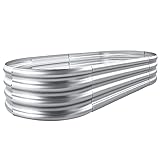 Top
Top Top
Top | Raised Garden Bed Kit | Check On Amazon |
 | XLUX Soil Moisture Meter, Plant Water Monitor, Soil Hygrometer Sensor for Gardening, Farming, Indoor and Outdoor Plants, No Batteries Required | No Results |
 Top
Top Top
Top | 82 Pcs Garden Tools Set and Extra Succulent Tools Set | Check On Amazon |
 | Joeys Garden Expandable Garden Hose with 8 Function Hose Nozzle, Lightweight Anti-Kink Flexible Garden Hoses, Extra Strength Fabric with Double Latex Core, (50 FT, Black) | No Results |
 Top
Top Top
Top | Dual Chamber Compost Tumbler | Check On Amazon |
 Top
Top Top
Top | Sunnyglade Plant Stakes | Check On Amazon |
 Top
Top Top
Top | Organic Cold Pressed Neem Seed Oil | Check On Amazon |
 Top
Top Top
Top | Mighty Mint Gallon :-Insect and Pest Control Peppermint Oil | Check On Amazon |
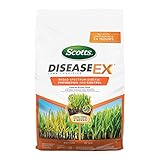 Top
Top Top
Top | Scotts DiseaseEx Lawn Fungicide | Check On Amazon |
 Top
Top Top
Top | Jacks Classic 20-20-20 All Purpose Fertilizer | Check On Amazon |
 Top
Top Top
Top | 30,000 Seeds Pollinator Attracting Wildflower Mixture | Check On Amazon |
 Top
Top Top
Top | Survival Vegetable Seeds Garden Kit-Over 16,000 Seeds | Check On Amazon |
Water permeability
The soil you used must be able to enter the soil and reach the roots of the ginger plants.
If you use compact and tight soil, the water will remain over the surface and evaporate slowly.
So, it would be better to avoid compact and tight soil types, for example, clay soil.
Mulching
Mulching should also be considered while selecting the soil.
It is because after you plant the ginger plants, you may have to add some mulch.
These mulches will mix in the soil and make the soil more nutritious.
Mulch controls weed growth, reduces soil depletion, and stops water evaporation in dry weather.
Best soil types for ginger plants
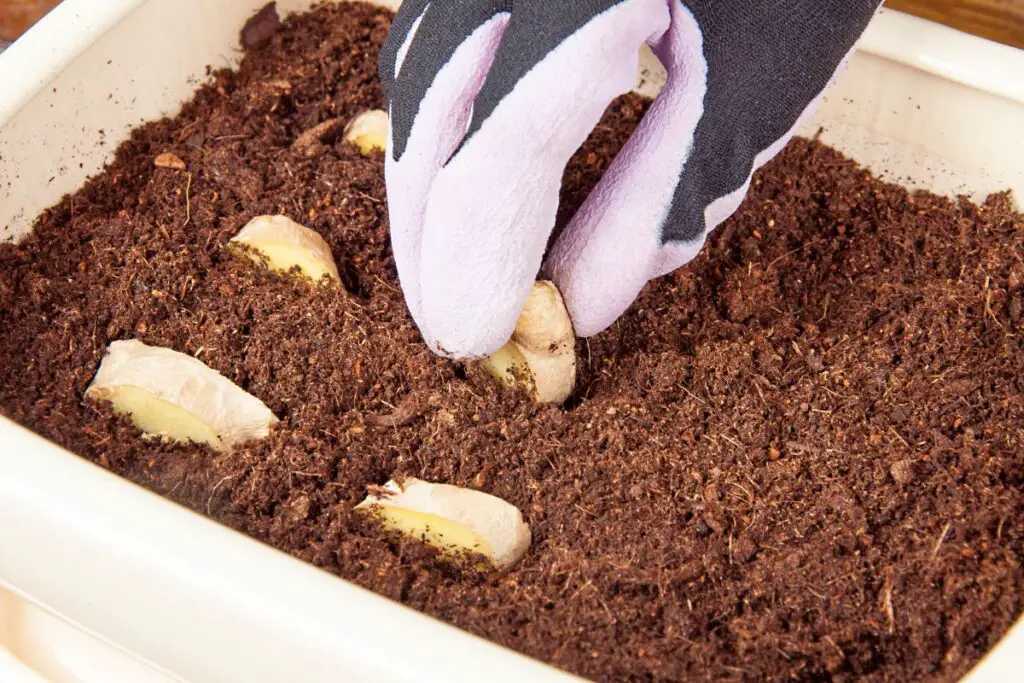
Ginger plants must grow over well-drained soil, rich in nutrients, and has enough moisture levels.
The moisture and nutrients help the ginger plants to photosynthesize properly, which further results in the good growth of the leaves, roots, and rhizomes.
Here are some best soil types of ginger plants:
Loamy soil
Getting loamy soil for plants is every grower’s dream.
It contains equal amounts of sand and silt along with some amount of clay.
It is perfect for drainage, retention, and fertility.
It is not only favorable for the ginger plants but also for several other flowering and vegetable plants.
Compost soil
The presence of organic matter in the compost soil improves drainage, retention, and nutrition level, thus resulting in healthy vegetables and crops, including ginger.
The best part about compost soil is that you can make it on your own with some common ingredients.
Potting mixes
Several potting mixes are available, starting from well-draining, moisture-retentive, and highly fertile with adequate nutrients and minerals.
Visit a store and buy an ideal potting mix for the ginger plants instead of making recipes with different ingredients.
How to prepare the soil for growing ginger?
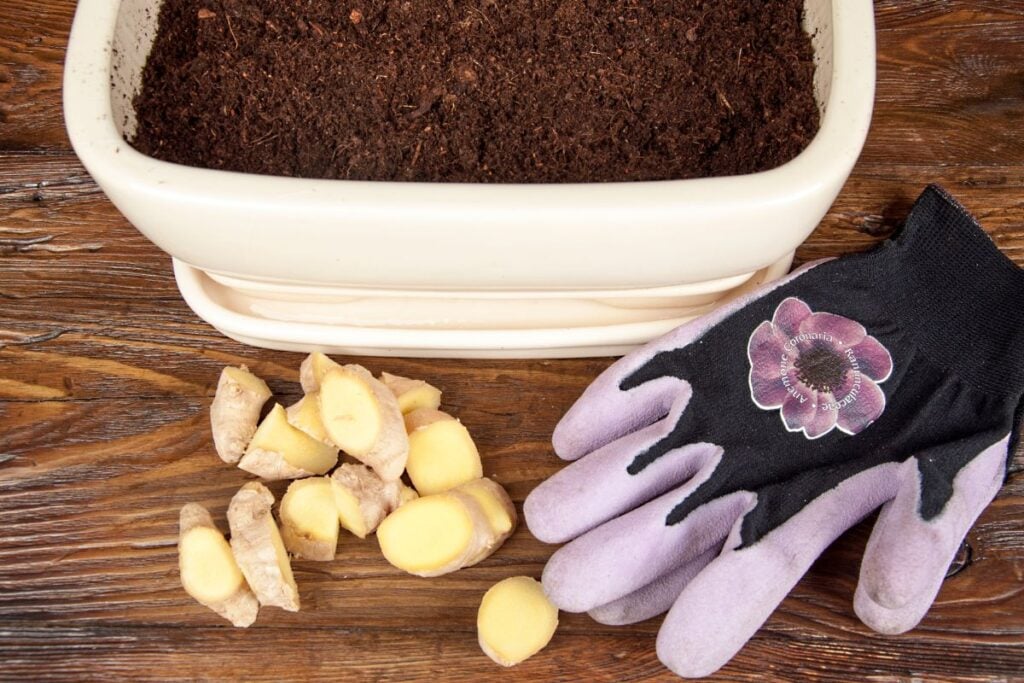
As mentioned earlier, the best soil for ginger plants is loamy, well-drained, and fertile.
Rich and loose soil can provide adequate moisture and nutrients for good growth.
Keeping these things in mind, prepare the soil in the ground and pots.
In the ground
Before planting, it is necessary to prepare the land you have chosen for ginger plants.
After that, you have to prepare the soil bed.
The preparation of the ground of ginger plants starts in the early summer.
Plow the ground 4-5 times to make fine tiles.
Next, eliminate the weeds, straws, woods, and roots of old plants from the soil.
Prepare a bed about 1 meter wide, 15 meters tall, and length of your choice.
Maintain a distance of about 40-50 cm if you create multiple beds.
To sanitize the soil, let the soil cook under the sunlight for 40 days.
To cook the soil with proper heat, add translucent polythene sheets to areas prone to root diseases and parasites.
Add well-rotted cow manure or fertilized neem cake at 25-30 tonnes per hectare to the soil bed.
Along with that, add 25 kg of each potassium and phosphorus.
You can apply this mixture by broadcasting on the soil bed before planting or at the pits during the planting time.
In addition to manure and nutrients, also add 75 kg of nitrogen per hectare in two parts:
- 40 days after planting
- 50 days after the first application or 90 days after planting
You can also mulch the soil beds with compost or straw to control weeds and prevent water evaporation.
Alluvial gravel added with red soil is also good for ginger growth.
In pots
Add garden soil with equal amounts of well-rotted manure.
Buy potting soil from the garden stores if the soil is poor or heavy.
You can also start growing ginger plants in a shallow pot or tray filled with sphagnum moss or coconut fiber.
It will drain well and prevent overwatering in the young plants.
Transplant the young plant after new leaves and roots have developed.
Ensure that the soil you transplant the plant into remains well-drained, loamy, loose, and at 5.5-6.5 pH levels.
Fill the pots with suitable soil, and plant the rhizomes in it.
Water in small amounts at first and let the soil dry a bit. After that, keep the soil consistently moist.
How can I grow ginger plants in poor soil?
Ginger plants thrive in loamy, airy, sandy, and rich soil.
Loose particles drain the water well, and the air enters the soil and reaches the roots.
Air is important for the chemical reactions in the root areas.
If your soil has poor drainage, add vermiculite, compost, and perlite to improve the drainage quality.
If it is poor, compost can make it nutritious.
If the soil is acidic, add dolomite to make it neutral.
If it is alkaline, add coffee grounds or sulfur to increase the acidity.
Soil amendments, alternatives, and mulch

If you are growing ginger plants in lean soil, add some liquid fertilizers every other week during the growing season.
Do this mostly if you live in rainy areas because the nutrients get washed away with repeated rains.
You may add seaweed extract or fish emulsion to feed ginger with enough nutrients.
To maintain the soil moisture, mill around the plant in the early spring after planting.
Alternatives
If you don’t want to use garden soil in pots or raised beds, you can use other alternatives like:
- Kelp meal
- Alfalfa meal
- Organic compost
Mulching
Add an inch of mulch to maintain the moisture content.
Once the mulch breaks down, it also adds nutrients to the soil.
Mulching also prevents soil depletion due to wind, rains, and animal pests.
Some good mulch options are:
- Leaves
- Wood chips
- Straw
- Animal manure
- Grass clippings
- Plastic film
Some commercial mulches are:
- EZ-Straw seeding mulch
- Fibredust CoCo mulch
- Wood Smith Natural Wood chips
- Hydrofarm Grow! Coco Coir planting chips
Best soil mix recipes for ginger plants
Though several commercial soils are present in the markets, making your soil mix is a better option because:
You are satisfied that you have used the right products that help drainage, retention, and fertility.
You also gather an idea about the soil mixes and use it later if commercial potting mixes are unavailable.
Let’s share some soil recipes:
Recipe 1
Equal parts of:
Recipe 2
Recipe 3
- 70% compost
- 10% coconut coir
- 20% garden soil
Recipe 4
- 50% compost
- 50% cocopeat, or soil, or peat moss
- ½ teaspoon Trichoderma powder to prevent fungal diseases (optional)
Some commercial soil for ginger
To avoid putting extra effort into collecting separate ingredients and mixing them, try some ready-made commercial mixes:
Pro-Mix Premium Organic soil
The mixture is ideal for adding extra organic matter to the soil surface.
It has enough nutrients to make the ginger grow well and contains a pH of 5.5-7.5.
The soil mix contains sphagnum moss, peat moss, perlite, and organic fertilizer to feed your ginger plants for 3 months.
Espoma Organic garden soil
With the same pH level as before, this soil mix is great for beginner growers as it contains sufficient nutrients and fertilizer to feed your plants for several months.
Fox Farm Ocean Organic Soil Mix
The soil is organic, well-aerated, and can be used for seedlings and planting ginger and other vegetables.
The micronutrients in the soil make the soil ideal for indoor and outdoor gardening.
As it contains adjustable pH levels, it helps in healthy growth.
Miracle-Gro Expand n Gro soil
The soil is affordable and lightweight, thus making ginger larger and better.
The good thing about this soil is it can expand about 50% once it is watered.
The soil can make your plants look three times bigger within 6 months.
Sun Gro Organic Soil
You can use this soil for both indoor and outdoor purposes.
The soil is organic and loamy, with a mixture of perlite and pumice, hence perfect for the ginger plants.
It also has earthworm castings, peat moss, and nutrients, boosting better ginger growth.
Final thoughts
Finding and making the right soil type is easy once you know what soil ginger needs. Well-drained, airy, loamy, and fertile soil is the best type for ginger plants.
Add compost before planting ginger to make the soil organic. It also helps improve drainage and moisture retention. Add a layer of mulch to prevent water evaporation and weed growth. When the mulch breaks down, it adds supplementary nutrients to the soil.
Besides growing in the ground, you can grow ginger in pots and raised beds. Use the soil mixes I have recommended for better results. However, there are many other soil mixes for ginger except those mentioned in this article. Make sure it is loamy and fertile.
Reference: Ginger Production, Texas AgriLife Extension, USDA, Wikipedia
